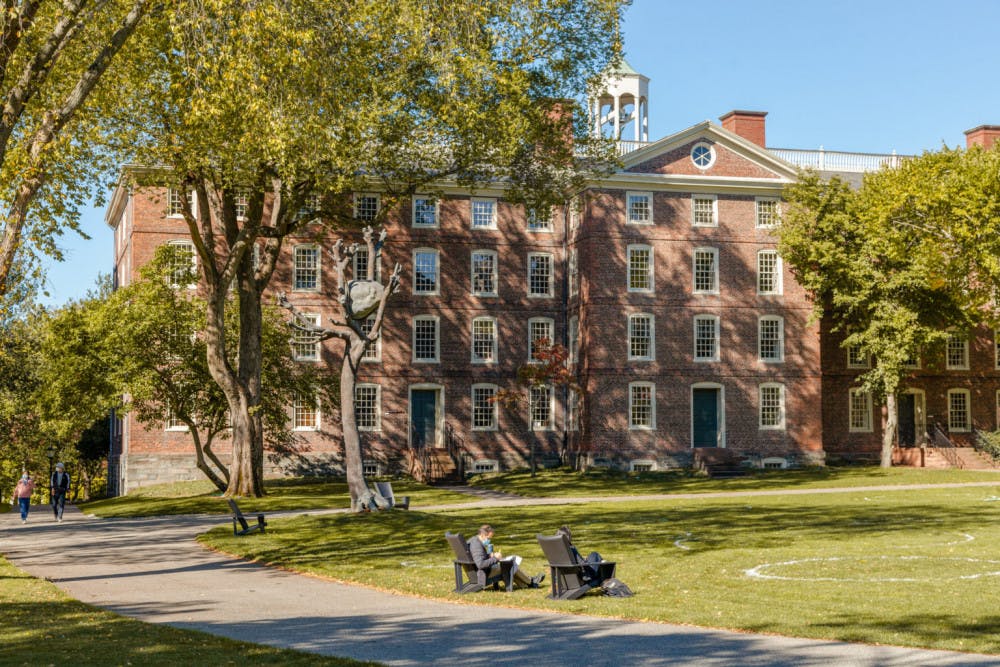The Graduate Labor Organization and the University reached a tentative agreement over a pay raise for graduate student workers Thursday, GLO and University sources confirmed to The Herald.
The agreement includes a 2.5 percent increase to the Academic Year Base Stipend — which is the minimum stipend paid to graduate students during the academic year under the terms of the University’s contract with GLO — and a one-time $750 payment to graduate students to cover pandemic-related costs, according to an email from Provost Richard Locke P’18 to graduate students and faculty reviewed by The Herald.
“The tentative agreement is the result of a productive and collegial set of negotiating sessions between the University and GLO, and we appreciate the spirit and commitment to collaboration that all parties brought to the table,” Locke wrote.
The agreement also includes increases to summer stipends for graduate students. The summer stipend for graduate students in the sciences, currently $8,977, will increase by 2.5 percent. The University will raise the summer stipend for doctoral students in the humanities and social sciences, which is currently $5,373, to be at parity with the stipend for science graduate students over the next two years.
In the agreement, the University pledged to conduct an “equity review” of the Academic Year Base Stipend before the end of 2021. This equity review will take into account “market conditions, cost of living in the Providence area (such as housing) and the sufficiency of the stipend and other forms of financial support (including the Summer Base Stipend) afforded to graduate students,” Locke wrote. As part of the review, the University committed to increasing the stipend by at least $750 for the 2023 fiscal year.
The union members will vote on ratifying the agreement May 6, according to GLO Communications Coordinator Talie Massachi GS.
“We are delighted to have reached this point today, and look forward to the full membership of GLO considering and ratifying the tentative agreement in the coming days,” Locke wrote.
Massachi said the GLO bargaining committee and executive board are happy with the tentative agreement.
“From a personal standpoint, I think that admin listened to the arguments that we’ve been making about why we deserve this raise,” Massachi said.
GLO and the University reached the tentative agreement following weeks of negotiations. The GLO effort to push for a pandemic pay raise was part of the union’s larger “Raises, Rights and Respect” campaign, which is focused on listening to the experiences of graduate workers, GLO President Rithika Ramamurthy GS previously told The Herald.
GLO argued in negotiations with the University that graduate workers deserve a pay raise because many have incurred additional costs to keep working through the pandemic, The Herald previously reported. Some of these costs include buying supplies to work from home, updating Wi-Fi and purchasing books, GLO Union Workplace Steward Rose Rowson GS previously told The Herald.
The one-time $750 payment is intended to directly address the financial impact of working remotely, Locke wrote.
During the annual bargaining session between the union and the University that began in March, GLO asked for a 10 percent stipend increase for all graduate students to compensate for pandemic costs, The Herald previously reported. The University countered with an offer of a 2.5 percent pay increase.
GLO lowered its bargaining demands to a 6.5 percent raise, then again to 5.5 percent, over the course of negotiations, Massachi said. According to Massachi, there had been “no significant movement” from the University in negotiations until last week.
Massachi attributed the agreement’s ultimate success to continued support over the past several months, from members attending bargaining sessions to public support from elected officials and union leaders.
GLO held a virtual rally April 21 featuring Ward 1 City Councilman John Goncalves ’13 MA’15, State Senator Tiara Mack ’16 and State Representative David Morales MPA’19. In a letter released the day before, Goncalves, Mack, Morales and 26 other elected officials and labor leaders in Rhode Island called for the University to meet GLO’s demands and “lead by example and set the standard for fair compensation.”

Ben Glickman was the 132nd editor-in-chief and president of The Brown Daily Herald. He previously served as a metro editor and oversaw the College Hill and Fox Point beat, in addition to writing and editing about city politics, COVID-19 and the 2020 election. He is the co-creator of the Bruno Brief, The Herald's first news podcast. In his free time, he is passionate about birds (also tweeting) and eating way too spicy food.





